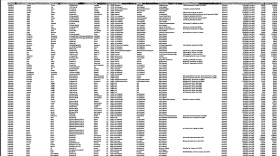A federal lawsuit challenging New Hampshire's new voter residency law will move forward toward a likely January 2020 trial, after state attorneys failed to convince a judge that it should be thrown out because it would not change any voting requirements.
The New Hampshire Democratic Party and the American Civil Liberties Union are behind the lawsuit seeking to overturn the new residency law, known as House Bill 1264.
The law, which took effect in July, drew intense (and largely partisan) debate during its path through the Legislature. Supporters, including the Secretary of State’s office, argued it was needed to clear up confusion around New Hampshire’s voting rules and ensure fairness in the state’s elections.
Critics argued the law deters otherwise qualified people from voting by requiring anyone who casts a ballot in New Hampshire to follow the same rules as full-time residents — like getting an in-state driver’s license or registering a vehicle — even if they don’t live here year-round.
Despite the law’s legislative origins, the state's attorneys have tried to get the lawsuit against HB1264 dismissed by arguing that it would not, in fact, affect voting rules. The state’s attorneys have also taken the position that Secretary of State Bill Gardner has no role in carrying out the new requirements imposed by HB1264.
Judge Joseph Laplante wasn’t convinced by these and other arguments the state’s attorneys made for why the lawsuit should be thrown out.
But Laplante also said he wanted to allow more time for a deeper exploration of the facts at the heart of the case, as explained in this excerpt from his ruling:
“Plaintiffs allege that HB 1264 effectively operates as an unconstitutional poll tax, by requiring certain voters to pay fees for motor vehicle licenses and vehicle registrations triggered by their registration to vote. Defendants argue that this claim ignores the way in which the law actually works. No fees are required for voting, they contend, and residency triggers the potential motor vehicle fees – not voting or voter registration. These arguments may ultimately prevail, especially with a fuller understanding of how residency is evaluated outside of voter registration.”
This isn't the first time HB1264 has faced legal scrutiny, though it is its first test in federal court. Last year, the New Hampshire Supreme Court reviewed the law at the request of Gov. Chris Sununu and determined that it did not violate the state constitution. At the time, however, two justices abstained from the ruling over concerns the court should have given the law more thorough consideration in court before issuing its opinion.








